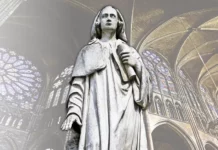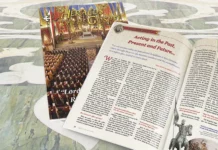Like the King of the Universe, who was born in a cold grotto and died crucified by the world’s leaders, Louis XVII began his reign in prison and bore the heavy yoke of revolutionary hatred until his death.
Paris, January 21, 1793. The beating of drums are heard throughout the capital, followed by the roar of a crowd thirsty for blood. Suddenly there is an astonishing silence, which takes over the square as the criminal reaches the scaffold.
The criminal? Yes. What law had he broken? The law imposed on the nation by “liberty, equality and fraternity”: the monarchy is “oppressive” and must therefore be exterminated. The defendant’s “crime” was to be King of France, which justified his being treated like the worst of outlaws!
In the square, the silence is sustained for a few more moments because, incredible as it may seem, remnants of respect for hierarchy and love for nobility still throb in the hearts of the French people thronged there. Months before, they had enthusiastically acclaimed King Louis XVI, whom they now watch being put to death, soon to appear before the just judgement of God.
A final drum roll ensues, and the implacable blade of the guillotine descends on the neck of the unfortunate monarch.
The “best wine” of the French royalty
For some, the news of the king’s death caused terror and consternation; for others, it was the occasion for dancing and singing, which quickly culminated in veritable orgies, typical of the vile spirit that the French Revolution propagated among its adherents.
Nevertheless, the hand of God, who had so lovingly guided the Church’s first-born daughter down the centuries – from the Baptism of Clovis, through the reign of the great Charles and rejoicing in the virtue of St. Louis IX, until that terrible day – had not been withdrawn from her. The “best wine” of her royalty, a little boy, was reserved for France and for all of history.

Yes, a child who, in his prison, bitterly mourned his father’ death, embraced by his mother, thenceforth a poor widow. Upon this young boy of just seven years of age descended the mantle of the Most Christian Kings, which in turn would grow in dignity as it covered an innocent child crowned by sorrow and martyrdom.
The Dauphin Louis-Charles, born on March 27, 1785, son of the illustrious Princess of Austria and Queen of France, Marie Antoinette, and King Louis XVI, was already acclaimed as Louis XVII by all the nations of Europe and by the French who remained loyal to the monarchy.
A reign marked by fidelity amid tragedy
“Vive le Roi! Vive Louis XVII!”, was the cry that echoed among the Catholic troops of the Vendée and the army of the Duke of Condé. However, like the King of the Universe, who was born in a cold grotto persecuted by the rulers of the world, little Louis XVII lived the first days of his reign in a prison, bearing the heavy yoke of revolutionary hatred and indignation.
The architects of the Revolution knew that through this child passed the golden thread of the royalty of France, whose almost legendary monarchy had imbued the ages of Christendom with its perfume. And they knew, therefore, that the story of the little monarch would define the future of Europe and Christian Civilization.
Wishing to overthrow any sound tradition, to bring to ruin the order established by the Church in customs, and to implant chaos and equality in souls and peoples, they used Machiavellian means to plot the mysterious disappearance of this young king. To do so, they began by separating him from the only one who could support him, sustain him and advise him in those dramatic circumstances: his mother.
During the most sublime tragedy in human history, the Passion of Our Lord, there occurred a poignant and heart-breaking scene: Jesus’ meeting with Mary and their solemn farewell on Calvary. After entrusting Her to the Apostle John, the Divine Redeemer expired, physically separating himself from Her who, of all creatures, was the most beloved of His Sacred Heart.
Who can imagine the sorrows that this separation caused the Immaculate Heart of Mary? No one! For no mother ever loved a child as the Blessed Virgin loved hers, who was God himself!
A future century would see another mother who, within due proportion, suffered sorrows similar to those of Our Lady when, in the prison of the Tower of the Temple, her beloved son, the dauphin of France, was snatched from her arms.
Weeping, threats, cries and lamentations… Nothing moved the hardened hearts of those revolutionaries. Seeing all her efforts come to naught, Marie Antoinette, whose abundant golden hair had become white due to the terrible anguish of her imprisonment, finally understood that this torment was permitted by God for reasons she could not comprehend.
Recalling the supreme martyrdom that He himself had embraced for the love of men, she armed herself with the courage that had strengthened the Blessed Virgin to remain standing before her dying Son, and with holy heroism she said to the little one desperately clinging to her: “No, my son, it is necessary to obey; it is necessary!” 1 Her motherly heart pierced with sorrow, she released hand of the boy, who finally accepted the cruel suffering which the elevated condition of king required of him in that hour.
It was, in fact, necessary for an innocent child to suffer for the sin of his people. Thus, snatched away from the affection and care of his mother, Louis XVII began his sorrowful calvary.
Cruel and slow martyrdom, endured with sanctity
Taken to a separate area of the Temple Tower, the dauphin was placed in the hands of Simon the cobbler, a “faithful patriot”, given to drunkenness and the most depraved customs. He was to be the “tutor” of Louis XVII, who was only eight years old.
Taking advantage of the child’s puerile naivety, the shoemaker taught him revolutionary songs and often caused him to become drunk so that he would insult the crown and sign documents that favoured the new French “government”. 2
It is difficult to describe in a few lines the pitiable condition to which Simon’s ill-treatment reduced the little king… His health was shattered; his physiognomy, once sweet and smiling, was stamped with sadness, his cheeks hollow and pale. His limbs appeared elongated and disproportionate, his back curved, and his bearing downcast. 3
However, young Louis’ personality remained steadfast. In moments of sobriety, he vigorously opposed Simon’s suggestions, and was accordingly punished with furious insults, slaps, kicks and even more violent aggressions, such as being grabbed and shaken in the air until his whole body was dislocated.4
The foul shoemaker’s wrath was so unbridled that, one day, realizing that there was no way he could force the boy to say “Long live the Republic!”, he had to be restrained by an acquaintance who was present, to prevent him from killing the little one with blows…
However, in the face of such horror, the dauphin constantly showed signs of virtue and patience. A moving example occurred in relation to the fact narrated above. History tells us that “on the following day, when [the same acquaintance] returned [to Simon’s quarters], he was surprised to be presented with an apple by Louis XVII, who told him that he had saved the dessert of the previous day to offer to him in gratitude for having saved his life.” 5 In fact, though exhausted by torture and imprisonment, the young king never lost his nobility of soul and blood; on the contrary, suffering only refined these qualities in his heart.
In several other circumstances Louis XVII shone before God by his pious dispositions. On one occasion, Simon caught him praying in the early hours of the morning, kneeling on his straw mattress; the next day, seeing the little one again at prayer, the brutish cobbler surprised him from behind with a basin of icy water which completely drenched him and his bed. On another occasion, the child showed signs of profound self-detachment when, on being questioned as to what he would do if the Vendeans restored the throne of France, he replied, “I would pardon you.” 6 The greatest proof of his virtue, however, is undoubtedly found in the fact that “he never [formulated] the slightest reproach, [nor] the slightest accusation against those who had tortured him.” 7
This young king was an authentic martyr in body and, above all, in soul. His fidelity to God and to France, amid so many torments, marked history forever.

New and even more harrowing ordeals…
As the Revolution always deceives its agents, a change of powers brought Simon himself to the guillotine. The little dauphin, almost destroyed by so much ill-treatment and with his health completely ruined, was then thrown into a prison cell and forgotten there like one buried alive. For six long months, he was left alone, watched only by the prison guards. He had already fought, with the same heroism of his forefathers, the sinful and satanic influence of Simon; now he had to face even crueller adversaries: abandonment, solitude and fear.
Thus began a new “unceasing martyrdom, of heart and spirit, profound and harrowing, utterly unspeakable, piteous to everyone, but which only God could have known. By all appearances, he must have felt entirely abandoned by the Angels and by his own, and handed over, defenceless, to the hatred, the barbarous cruelty and the insulting vulgarity of his enemies who sought only to destroy him and, in him, France, of which he was the incarnation.” 8
Who can possibly penetrate into the enormous inner struggles that this young soul waged in his solitude? The time spent in prison seemed an eternity to him… Dreadful spectres tormented his tender heart and anguish took hold of his being, once so full of strength and courage. His short life resembled the worst of nightmares: far from the respect, pomp and honours to which he was entitled, without the least occupation that could distract him, without a single word to cheer him and, above all, without someone to support him in that harsh situation. His days passed like years, and months like decades…
Meanwhile, while the Revolution was spreading terror throughout France, the blood of this king, victim of his own people, was presented to God as an offering of sweet and irresistible odour.
The scorn of the nation, he bore the sins of his people unto death
Months passed, and the leadership of the government took yet another turn. Those responsible for the dauphin – now less radical and hateful – seeing his frightful state, began procedures for his recovery. However, the boy’s health had deteriorated to such an extent that the efforts of the doctors were useless, serving only to prolong his agony…
There is a poignant phrase of Scripture, applied to the Divine Wounded One: “But I am a worm, and no man; scorned by men, and despised by the people” (Ps 22:6). Like Our Lord Jesus Christ, the body of this King of France was covered with ulcers; unrecognizable, he could not move without pain. Having become, like Christ, the scorn of his nation, he also bore the sins of his people. Out of love for his own people, he had to drink to the last drop the chalice destined for him.
In June 1795, the final hour came for the little martyr. Lying in bed, with violent pains wracking his entire body, his physiognomy suddenly became placid and serene. One of those accompanying him, holding his hand, said to him, “I hope that you will not have to suffer any more…” And he received this reply, full of unction: “Oh! I suffer still, but much less. The music is so beautiful!” Surprised and filled with compassion, the attendant asked him from which direction the music came, to which he replied, “From above! And I can distinguish the timbre of my mother’s voice among the others!” 9
Some time later, the jailers changed their shift. When the new guard approached him, realizing that the boy was in the last moments of his existence, he asked him how he felt. The poor little orphan, insisting on what he had said before, replied: “Do you think my sister is listening to the music? It would do her such good if she could hear this music!” 10 In the face of such innocence and nobility of soul, a respectful silence suffused the hearts of those who accompanied him.

After a few more moments, with his eyes bright and wide open, the young king, with the look of one in ecstasy, raised himself with great difficulty and said: “I have something to say…” 11 However, his strength left him, and men were not worthy to hear the last words conceived by his virginal heart; they remained like a precious secret which God wished to reserve for himself. Very calmly, the child laid his head back again, and delivered his soul to the Sacred Heart of Jesus, the One who, more than a hundred years before, had granted to the sovereigns of France the privilege of His friendship, His love, and His predilection. It was June 8, 1795.
At last, Heaven welcomed him!
Surely, the little martyr king could soon find consolation and repose from all his torments in the arms of Our Lady! To this son of so many sorrows, to this heir of so many treasures, to this warrior who embodied in himself the most beautiful and daring heroism of his lineage, Mary Most Holy, Mother of Mercy, could not fail to open, with tenderness, the gates of Paradise!
Although he has not been beatified by the Church, Louis XVII deserves all our admiration, our enthusiasm and our enchantment, for he left a sublime example for future centuries. By accepting with heroic grandeur sufferings far beyond his strength, and by enduring for the nation’s benefit the torments that same nation inflicted upon him, he taught us to act like other Christs when the winds of tragedy assail the gates of our souls! ◊
Notes
1 ESCANDE, OP, Renaud (Dir.). O livro negro da Revolução Francesa. Lisboa: Alêtheia, 2010, p.134.
2 Cf. Idem, p.137.
3 Cf. BEAUCHESNE, Alcide de. Louis XVII, sa vie, son agonie, sa mort. Captivité de la famille royale au Temple. 8.ed. Paris: Hachette, 1871, v.II., p.163.
4 Cf. ESCANDE, op. cit., p.137-138.
5 Idem, p.138.
6 Idem, p.136.
7 Idem, p.143.
8 Idem, p.141.
9 Cf. BEAUCHESNE, op. cit., p.324-325.
10 Cf. Idem, p.325. A reference to Marie-Therese Charlotte, the Madame Royale, the older sister of Louis XVII and, like him, a prisoner in one of the sections of the Temple Tower.
11 Idem, ibidem.








Thank you for writing this beautiful piece about the King, Queen and dauphin of France. What a tragic story! May we all learn the truth of this story and may it never repeat.